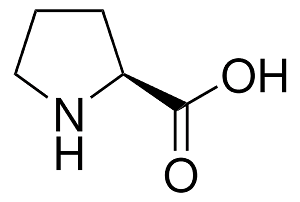HI! I’M ELEMENT AI.
L-Proline

Product Description
L-Proline is a versatile compound with various industrial and commercial applications.
Product:
L-Proline
CAS:
147-85-3
Synonym:
(S)-Pyrrolidine-2-carboxylic acid
Structure:

Typical Characteristics
Appearance
White powder
Density
1.35-1.38 g/cm3
Melting point
220-222 °C (decomp)
Molecular Weight
115.13
Odor
Odorless
Purity
≥99%
Refractive index
1.487
Uses, Applications & Markets
Key applications
get a quote



L-Proline used in many
industry applications
L-Proline is a versatile compound with various industrial and commercial applications. Here are some of its uses:
- Pharmaceuticals: L-Proline is used as a building block in the synthesis of pharmaceuticals, particularly in the production of peptides and proteins. It serves as a chiral catalyst in asymmetric synthesis and as a stabilizer in pharmaceutical formulations.
- Food Additive: It is used as a flavor enhancer and food additive in the food industry. L-Proline is added to food products such as soups, sauces, and snacks to improve flavor and taste.
- Cosmetics: L-Proline is used in the formulation of cosmetic products such as skin creams, lotions, and serums. It has moisturizing properties and helps improve skin hydration and elasticity.
- Cell Culture: L-Proline is commonly used as a supplement in cell culture media for the growth and maintenance of mammalian cells. It provides a nitrogen source and helps regulate osmotic balance in cell culture systems.
- Biotechnology: It is used in biotechnology applications such as protein purification and recombinant protein expression. L-Proline is added to protein solutions to stabilize protein structures and prevent denaturation.
- Photography: L-Proline is used in the photographic industry as a component of developers and fixers for black and white film processing.
- Chemical Synthesis: L-Proline serves as a chiral auxiliary in organic synthesis reactions, particularly in asymmetric synthesis. It is used to induce stereocontrol and enhance the enantioselectivity of chemical reactions.
- Textile Industry: L-Proline is used in the textile industry as a dyeing assistant and color fixative. It helps improve the dye uptake and color fastness of textile materials.
- Animal Feed: L-Proline is added to animal feed formulations to enhance animal growth and performance. It serves as a dietary supplement for livestock and poultry.
- Research: L-Proline is widely used in biochemical and biomedical research for studies related to protein structure, function, and metabolism.